Codeyoung is an online learning platform for kids. It offers live classes in coding, math, science and English for students about 5–17 years old. In this article, we look at Codeyoung reviews, pricing, how it works, and how it compares to others like My Engineering Buddy.
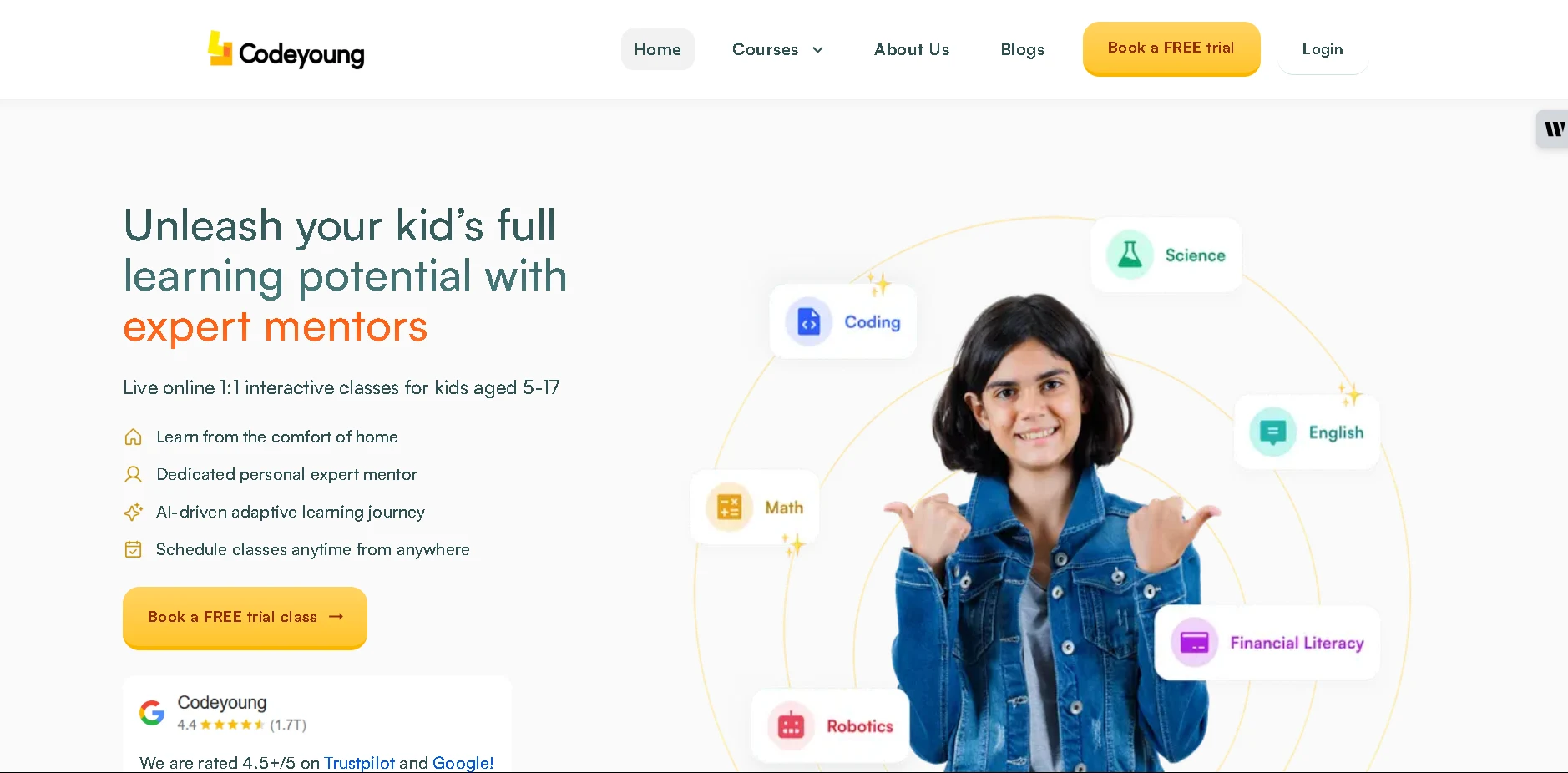
Codeyoung Reviews and Testimonials
On its website, Codeyoung says 30,000+ parents trust it and that it has a 4.5/5 rating on Trustpilot and Google. For example, a listing notes “4.5+ on Google and 4.5+ on Trustpilot, with thousands of parents praising the effectiveness, quality, and personalized nature of our classes”. A marketing page also claims “1000s of parents sharing positive feedback”. These suggest many satisfied users and high scores.
However, other reviews are mixed. A customer feedback analysis says Codeyoung gets “varied feedback” – many praise the teaching quality and mentors, but others note issues with scheduling and the old-school teaching methods. For example, some online posts warn of misleading promises or poor support, with one user telling others “Beware of Codeyoung” due to false refund promises and rude service. On Glassdoor, mentor reviews are around 3.8/5 (out of 5), which is moderate (some mentors like working there, others have concerns).
Overall, Codeyoung appears to be a legitimate company with many happy customers (as seen by high ratings). It has official accreditation and a long track record since 2019. But it also has some complaints, such as scheduling mix-ups, strict policies, and high fees. In summary, Codeyoung is a real tutoring service with strong suits in curriculum and results, but customers should check details and policies before signing up.
Codeyoung Pricing
Pricing Range
Codeyoung’s prices start around $30 per class. The exact rate varies by subject and tutor. For example, a basic coding class might be $30, while specialized topics like AI or robotics cost more. Tutors with more experience or higher ratings may charge higher fees. (All exact prices are listed on Codeyoung’s website.) Their terms note that course prices vary by course and are shown on the site. In short, plan on about $30+ per 1-hour class, with packages of multiple classes available.
What Students Say About Codeyoung Pricing
Some parents and students feel Codeyoung is expensive. Online posts mention paying hundreds to thousands of dollars for courses. For example, one parent reported paying about CAD 1800 for a package. Others say they were unhappy that scheduled classes were missed after prepayment. On the other hand, some say the teachers and results are worth it. (Exact user comments vary: some praise the quality given the cost, while others call it overpriced.) In sum, Codeyoung is not the cheapest option, and some users protest the high fees.
Hidden Costs
Codeyoung has a few extra fees to watch out for. If you request a cash refund, they charge a service fee of USD $199. This means you don’t get the full amount back in cash. Robotics courses use kits that must be bought separately, and those kits have their own refund policy. There is no small signup fee, but there are cancellation limits (you can only skip a few classes per bundle). In short, the main hidden cost is the $199 refund fee. Always check the policy before you buy.
How Codeyoung’s Pricing Works
Payment is made online. Codeyoung accepts credit/debit cards and bank transfers. You usually pay for the course or package upfront. They may offer installment plans (the terms mention prorated refunds for unused classes if Codeyoung fails to deliver). Discounts or promo codes appear occasionally: for instance, third-party sites list promo codes up to 40% off, though Codeyoung issues codes infrequently. You might also see seasonal deals or referral credits. Overall, pricing is prepaid, and you choose how many classes or credits to buy at once.
Free Trial
Yes, Codeyoung offers a free trial class. You can book one free demo session online. During the sign-up process, you pick a course, choose a mentor and time, and get a trial class at no cost. After the trial, if you are satisfied, you can enroll in a full course and pay. This lets students experience the teaching style before committing.
Refund Policy
Codeyoung’s official refund and cancellation terms are shown at checkout and emailed at enrollment. In general, they only refund unused classes if the student or company cancels under certain conditions. Importantly, they charge a $199 service fee for any cash refund. Some users say Codeyoung only offers credit (not cash) after the 60-day mark. The official line is that refunds are pro-rated and must meet the policy criteria. In practice, customers report mixed experiences: one user said Codeyoung refused a full refund and only offered course credit. So, expect a strict policy and fees if you cancel.
Codeyoung Alternatives
Some families look for alternatives to Codeyoung for reasons like cost, age range, or subject needs. If Codeyoung is too geared toward younger kids or is pricey, or if you need a different style of help, you might try another service. Below are some notable alternatives, including My Engineering Buddy:
My Engineering Buddy
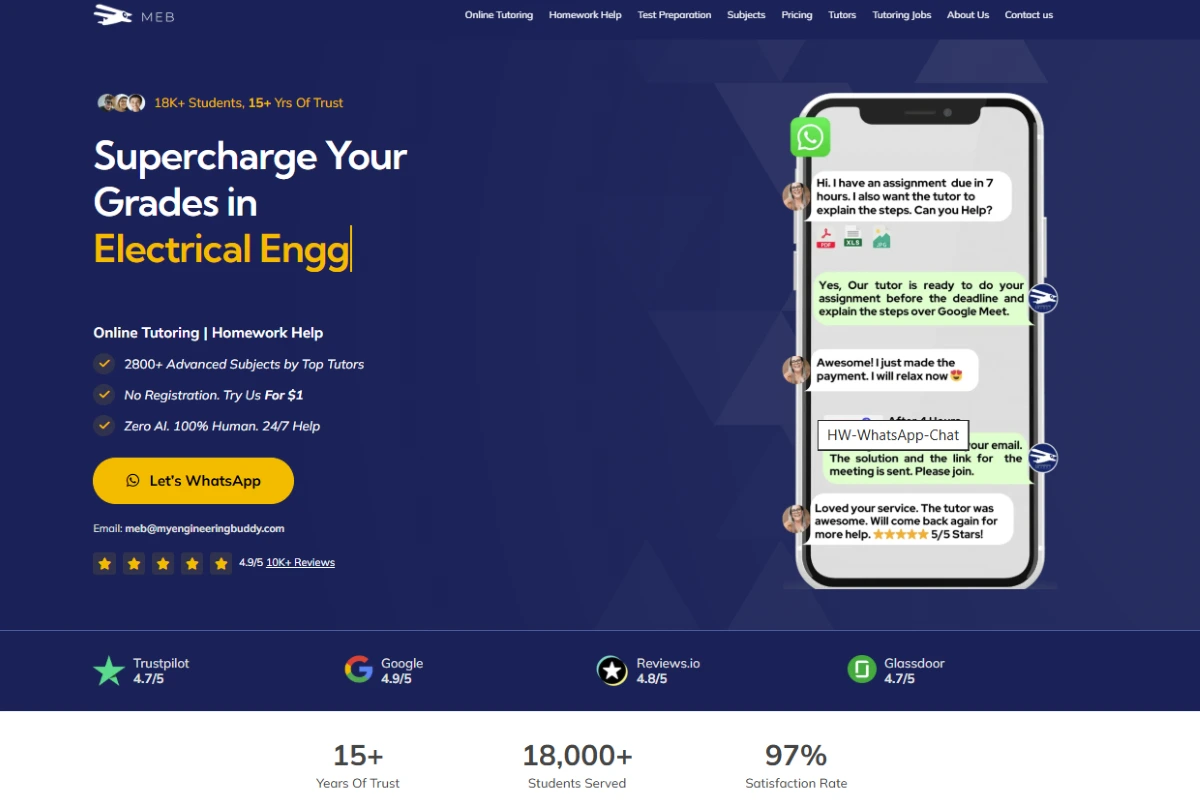
My Engineering Buddy (MEB) is an online tutoring service for high school and college STEM subjects. It covers physics, math, engineering, and coding for older students. MEB advertises top-quality tutors and has a 4.8/5 average rating from 287 reviews. Nearly 97% of reviewers recommend it. Compared to Codeyoung, MEB is stronger for advanced learners. It offers help on homework and projects across the US, UK, Canada, Australia and Gulf countries. MEB claims “top tutors” and “students consistently rate us 5 stars”. Codeyoung, by contrast, focuses on interactive classes for younger kids. In short, MEB is better for college-level STEM homework with very high ratings, while Codeyoung is better for K-12 coding and math classes.
Chegg Tutors (and Study)

Chegg is a large platform offering homework help, textbook solutions, and live tutoring (mostly by the minute or session). It covers many subjects up through college level. Chegg’s content is easy to use and often cheaper (subscription around $15/month for study help). On the plus side, you can get 24/7 answers. But the one-on-one tutor sessions may not be as structured as Codeyoung’s live classes, and tutor quality can vary. Price-wise, Chegg is generally cheaper than Codeyoung’s premium classes. If you want fast homework answers or occasional tutoring, Chegg is an option. Codeyoung has more structured live lessons and progress tracking.
Khan Academy
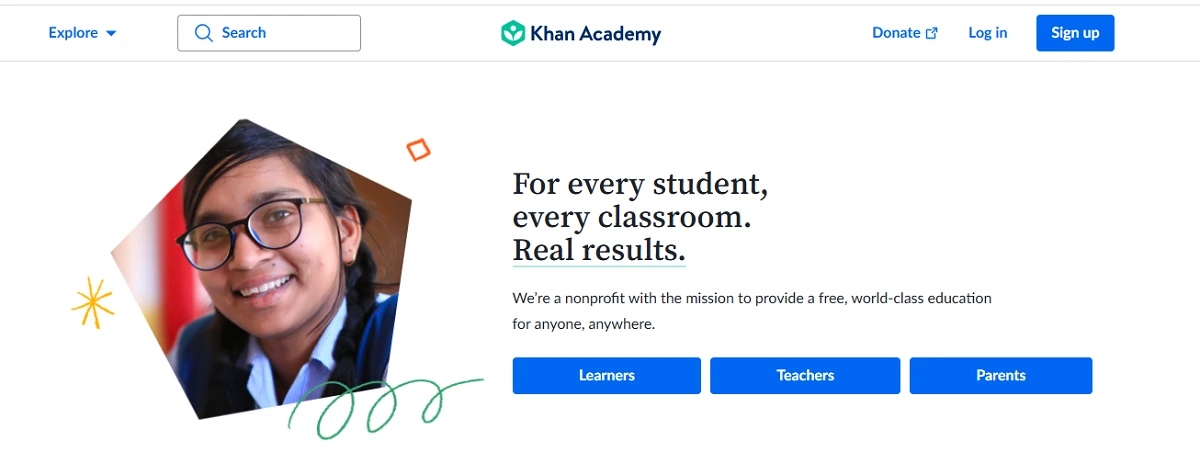
Khan Academy is a free online learning site. It offers video lessons and practice exercises in math, science, computer programming, and more for kids and high school. Its mission is “provide a free, world-class education to anyone, anywhere”. The big advantage is cost (it’s completely free) and a huge library of topics. However, it has no live tutors or personalized classes. It is self-study only, whereas Codeyoung provides live 1:1 classes with a teacher. Khan Academy is great for self-driven learners or exam prep on a budget, but if you want interactive live teaching, Codeyoung is better.
Outschool
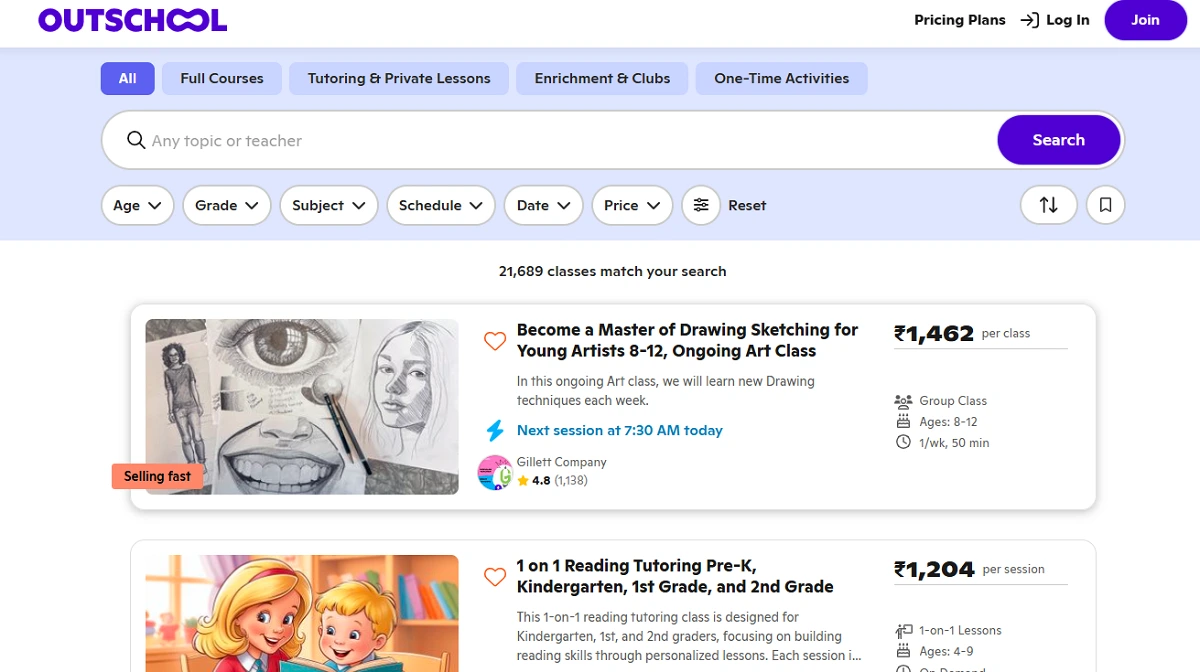
Outschool offers small-group and 1:1 classes online for kids (ages 3-18). Classes cover academics, arts, coding and more. You pay per class (often starting around $10 for a 1-hour group class). Outschool has thousands of teachers and flexible scheduling. Unlike Codeyoung, classes may have multiple students (for a lower cost) or be one-on-one by special arrangement. Outschool is easy to use (booking on their site) and classes are varied. It is usually cheaper per hour for group sessions. A downside is class quality varies by teacher. Codeyoung classes are always 1:1 live, which can be more expensive but more personalized. Overall, Outschool is a flexible, multi-teacher platform, whereas Codeyoung is a single-company platform with vetted mentors.
Varsity Tutors / Tutor.com
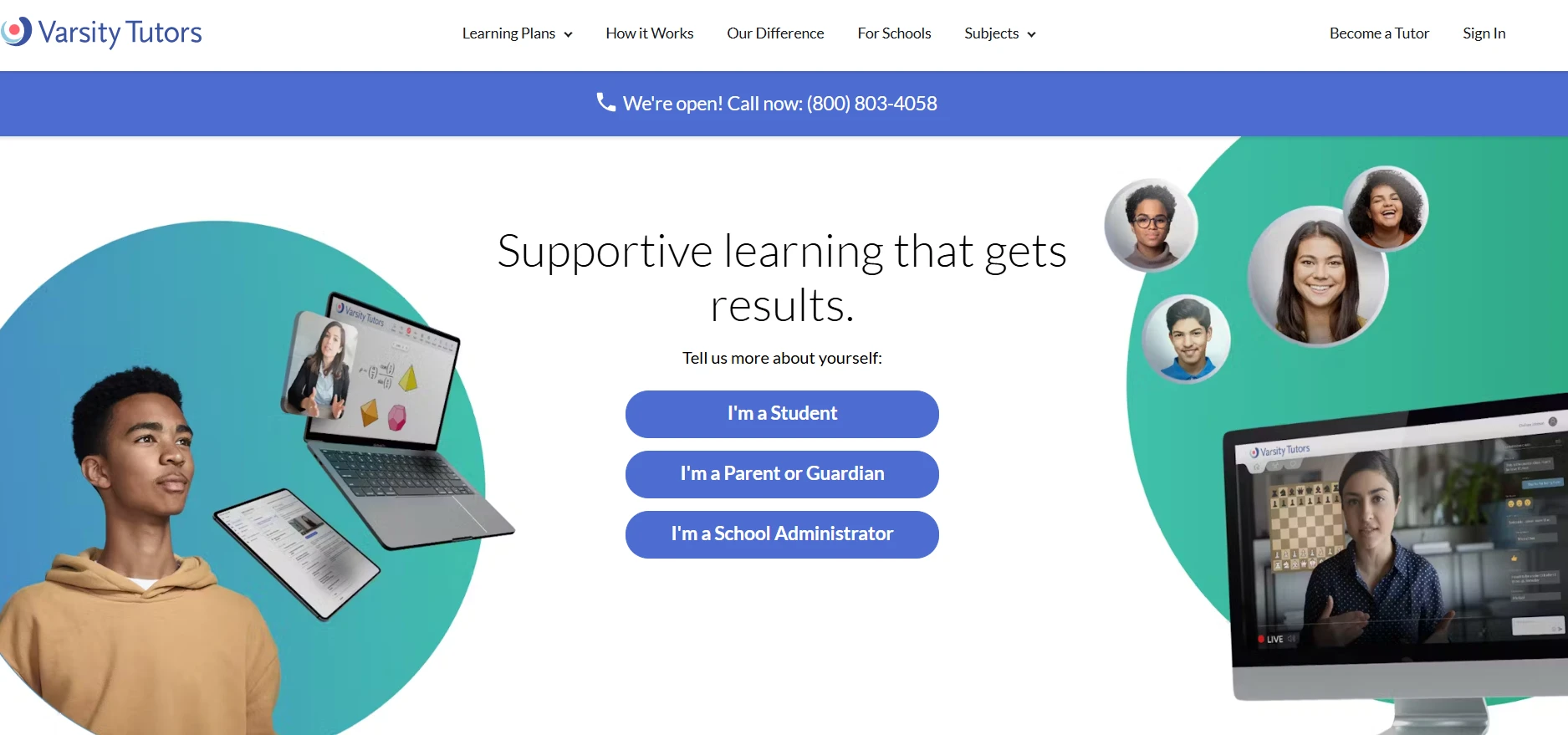
These services connect students with live tutors in many subjects. You can find tutors for math, science, coding, languages, etc. Pricing is typically hourly (often $40+ per hour) or via subscription. They offer on-demand sessions or scheduled help. The tutors are vetted but come from many companies. These platforms cover all ages. Codeyoung is similar in that it also offers 1:1 tutoring, but Codeyoung is for younger students and is packaged as courses. Varsity Tutors is more pay-as-you-go for any age. If you need college-level help or flexible scheduling, Varsity Tutors is a rival. Codeyoung may provide a smoother experience for kids due to its specialized curriculum and app.
How it Works?
For Students
A student starts by signing up on Codeyoung’s website or app. You select a course based on age or grade level. Then you book a free trial class. In the trial, you meet a mentor of your choice at a scheduled time. After the trial, if you like it, you enroll in the course and pay. You then attend live online classes at set times. Classes are usually 1 hour long, and you work with the same mentor each week. You access your classes through Codeyoung’s learning platform (or their app).
The platform shows your schedule, assignments, and progress reports. You can reschedule or cancel within the allowed limits. In summary: sign up → free trial → choose teacher and slot → attend classes → track your progress online.
For Tutors
To become a Codeyoung tutor (mentor), you apply on their website. You must have expertise in a subject (e.g. coding or math) and good English proficiency. Codeyoung shows that mentors need a strong educational background and some teaching experience. They sometimes hire mainly for specific time shifts (like evenings). Once hired, tutors teach live classes from home. Codeyoung advertises “lucrative earnings with perks and incentives” for mentors. Actual pay varies by hours and course.
Tutor reviews online are mixed: some mentors like the flexible work and training, while others cite low hours or strict schedules. Glassdoor ratings suggest an average mentor happiness. Tutors can give feedback on the platform, and Codeyoung provides teaching materials. In short: apply online, meet criteria, teach your subject in live classes, and earn per class. (Codeyoung also offers training and support for tutors.)
Codeyoung: Company Information
Codeyoung was founded in late 2019 by Shailendra Dhakad and Rupika Taneja. They met at a top engineering university and aimed to empower children through simplified learning. The mission is to help kids become innovators by making learning easy and fun. Codeyoung is based in India but serves students globally (especially in the US and Canada). It has enrolled over 20,000–30,000 students. The platform offers 1:1 live classes for school subjects. Its services cover coding (Scratch, Python, web/app development, AI, etc.), math, science, English and even test prep. Unique features include interactive coding curriculum, progress reports, and an AI tutor called Noah for extra practice.

USP of Codeyoung
- STEM Accredited Curriculum: All courses and mentors are STEM.org certified, ensuring high standards.
- Personalized Learning: Each student gets a tailored curriculum and detailed progress reports.
- Expert Mentors: They hire “top 1%” teachers and require strong credentials.
- Engaging Content: Codeyoung offers hands-on coding exercises and creative projects suited to each age.
- AI-Enabled: They use technology like AI tutors to adapt to the child’s pace.
- High Customer Trust: Thousands of parents rate Codeyoung very high (4.5/5 stars).
Drawbacks of Codeyoung
- Age Range: Mainly for kids up to 17. It’s not focused on college or professional levels.
- Price: It can be costly. Some customers feel packages are overpriced and strict to cancel.
- Scheduling Issues: Some parents report last-minute rescheduling or missing classes.
- Refund Rules: Strict policies (e.g. $199 refund fee) have upset users.
- Tutor Quality Varies: While many teachers are praised, others are reported to be inexperienced. Mentor feedback is mixed.
Comparison with My Engineering Buddy
My Engineering Buddy (MEB) is mentioned a lot by parents as an alternative. MEB targets older students and more advanced subjects. Its strength is expert tutoring in college-level STEM. MEB has very high ratings (about 4.8/5 from hundreds of reviews) and claims “students consistently rate us 5 stars”. It operates globally (US, UK, Canada, Australia, Gulf). Customers of MEB often praise its responsive support and subject depth. Compared to Codeyoung, MEB’s focus is on homework and engineering topics, not on younger kids. So if you need help in advanced math, physics, or coding, MEB may be better. Codeyoung shines at engaging kids in coding, but MEB is stronger for older students seeking top grades and guaranteed support.
Customer Support and Policies
Codeyoung offers support via email and phone. Officially, queries are handled through their support team (as listed on site). Users report that support response can be slow, and there have been cases where parents felt the support agents gave standard, unhelpful answers. Refunds and cancellations follow their strict policy (see above). MEB, by contrast, advertises “100% money back if not satisfied” as a guarantee. This suggests MEB may have a more generous refund promise. In practice, Codeyoung’s own policy page requires following certain steps and charging a large fee, so users should be aware. In summary, Codeyoung’s support is adequate for normal questions, but their policies are rigid; MEB seems to emphasize customer satisfaction more.
Global Reach and Localization
Codeyoung has students mostly in North America (US, Canada) and some other English-speaking regions, but it does not appear to offer content in languages other than English. All its materials and classes are in English. Its website is global, but marketing often highlights US/Canada families. MEB explicitly serves a wide international market (US, UK, Canada, Australia, and Gulf countries) and is also English-focused. Neither platform currently localizes into many languages (both use English for classes). So both have a global reach in English, with Codeyoung focused on kids in North America and MEB covering tech-savvy students worldwide.
Codeyoung’s Future Plans
Codeyoung has shown interest in emerging tech in education. Their blog highlights adding courses on artificial intelligence and generative AI to prepare kids for the future. They discuss how “generative AI classes… prepare them to succeed in an AI-dominated world”. Another blog mentions that coding courses will include AI, machine learning, AR and VR content soon. This suggests Codeyoung plans to expand its curriculum into advanced tech topics.
Additionally, Codeyoung already integrates AI into learning: they use an AI-powered tutor (Noah) and claim adaptive learning tools. They have also improved international payments through a partner to make global enrollment smoother (reportedly boosting success to 95%). While not all details are public, the trend is clear: Codeyoung is adding more high-tech content and expanding services worldwide.
FAQs About Codeyoung
How does Codeyoung compare to My Engineering Buddy? Codeyoung is aimed at younger students (ages 5–17) with coding and STEM classes, while My Engineering Buddy serves older students with advanced engineering and math help. Codeyoung offers structured live lessons and is popular for K-12 coding, whereas MEB offers on-demand tutoring for college-level subjects and has higher user ratings (4.8/5). In short, pick Codeyoung for kids’ programming classes and MEB for college STEM homework.
Who is Codeyoung for? Codeyoung’s classes are for school-age children, roughly 5 to 17 years old. It offers courses based on grade level, so younger children and teenagers can join. It is not designed for adults or college students.
What subjects does Codeyoung teach? Codeyoung teaches coding (Scratch, Python, web and app development, robotics, AI) as well as math, science, and English. It also has courses in creative areas like game development. All classes are live 1:1.
How much does Codeyoung cost? Classes start around $30 per hour for basic courses. Prices go up for advanced topics. You usually buy a package of multiple classes. Exact prices are listed on their site. Note that extra fees (like a $199 refund fee) can apply if you cancel.
Is there a free trial with Codeyoung? Yes. You can book one free trial class online. This lets your child try a lesson with a real mentor before you pay. If you like it, you can enroll in the full course.
What is Codeyoung’s refund policy? Codeyoung’s refund policy is shown at checkout. They offer prorated refunds for unused classes only under certain conditions. Beware that a $199 service fee is deducted on any cash refund. In many cases they offer course credit instead of cash. Make sure you understand the policy before buying.
Is Codeyoung legit? Yes. Codeyoung is a real EdTech company founded in 2019 with global accreditation. Thousands of parents use it, and it has high ratings (around 4.5 stars). It’s recognized in the U.S. and Canada, and even certified by STEM.org. While its legitimacy is solid, note some users have had service issues, so always do your homework on terms and reviews.
Conclusion
Codeyoung is a well-established tutoring platform for kids. It has many positive reviews for its engaging classes and qualified mentors. Its main strengths are a fun coding curriculum, personalized teaching, and strong STEM credentials. But it also has weaknesses: courses can be pricey, scheduling can be strict, and refunds carry heavy fees. For families with younger children who enjoy interactive coding lessons, Codeyoung can be a great choice. For older students or those seeking advanced tutoring, My Engineering Buddy is often better: it has higher user ratings and focuses on college-level STEM help. Weigh the pros and cons of each based on your student’s needs.
******************************
This article provides general educational guidance only. It is NOT official exam policy, professional academic advice, or guaranteed results. Always verify information with your school, official exam boards (College Board, Cambridge, IB), or qualified professionals before making decisions. Read Full Policies & Disclaimer , Contact Us To Report An Error

